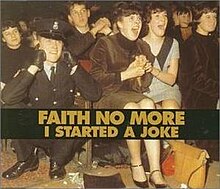
Best of Bee Gees is a 1969 compilation album by the English-Australian rock band Bee Gees. It was their first international greatest hits album. It featured their singles from 1966–1969 with the exception of the band's 1968 single "Jumbo".
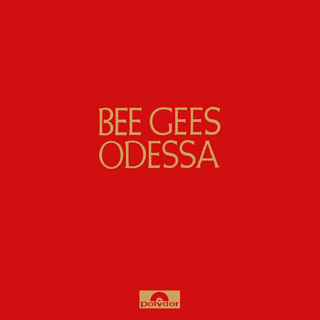
Odessa is the sixth studio album by the Bee Gees, a double vinyl LP released in February 1969, initially in an opulent red flocked cover with gold lettering. Despite reaching the UK Top Ten and the US Top 20, the album was not particularly well-received, though now is regarded by many as the most significant of the group's Sixties albums. An ambitious project, originally intended as a concept album on the loss of a fictional ship in 1899, it created tension and disagreements in the band regarding the work's direction; finally, a dispute over which song to release as a single led to Robin Gibb temporarily leaving the group.
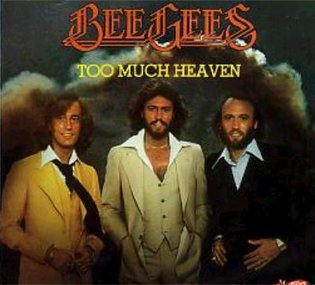
"Too Much Heaven" is a song by the Bee Gees, which was the band's contribution to the "Music for UNICEF" fund. They performed it at the Music for UNICEF Concert on 9 January 1979. The song later found its way to the group's thirteenth original album, Spirits Having Flown. It hit No. 1 in both the US and Canada. In the United States, the song was the first single out of three from the album to interrupt a song's stay at #1. "Too Much Heaven" knocked "Le Freak" off the top spot for two weeks before "Le Freak" returned to #1 again. "Too Much Heaven" also rose to the top three in the UK. In the US, it would become the fourth of six consecutive No. 1s, equalling the record set by Bing Crosby, Elvis Presley, and the Beatles for the most consecutive No. 1 songs. The six Bee Gee songs are "How Deep Is Your Love", "Stayin' Alive", "Night Fever", "Too Much Heaven", "Tragedy" and "Love You Inside Out". The songs spanned the years of 1977, 1978 and 1979.

Horizontal is the fourth studio album by the Bee Gees, and their second album to receive an international release. The LP was released in early 1968, and included the international hit singles "Massachusetts" and "World". On 5 February 2007, Reprise Records reissued Horizontal with both stereo and mono mixes on one disc and a bonus disc of unreleased songs, non-album tracks, and alternate takes. The album was released in Polydor in many countries and on Atco only in the US and Canada. "And the Sun Will Shine" was released as a single only in France. The influences displayed on the album range from the Beatles to baroque pop.
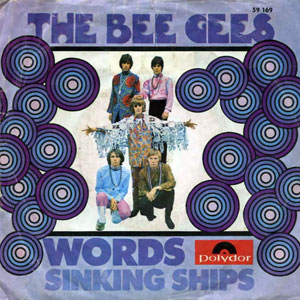
"Words" is a song by the Bee Gees, written by Barry, Robin and Maurice Gibb. The song reached No. 1 in Germany, Canada, Switzerland, and the Netherlands.
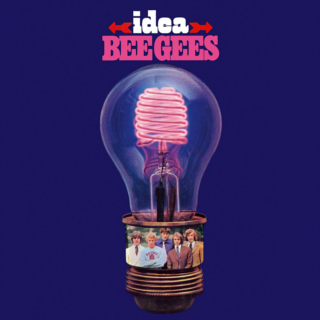
Idea is the fifth album by the Bee Gees. Released in September 1968, the album sold over a million copies worldwide. The album was issued in both mono and stereo pressings in the UK. The artwork on the Polydor release designed by Wolfgang Heilemann featured a "beehive" neon lightbulb with a group photo in its base, while the North American ATCO release designed by Klaus Voormann featured a composite head made from each band member. It was their third internationally released album – the first two albums being released only in the Australian market.
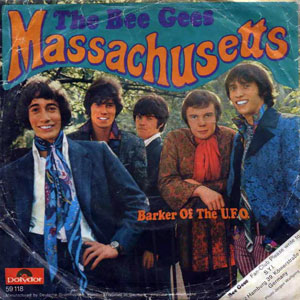
"(The Lights Went Out In) Massachusetts" is a song by the Bee Gees, written by Barry, Robin and Maurice Gibb and released in 1967. Robin Gibb sang lead vocals on this song and it would become one of his staple songs to perform during both Bee Gees concerts and his solo appearances. It later appeared on their 1968 album, Horizontal.
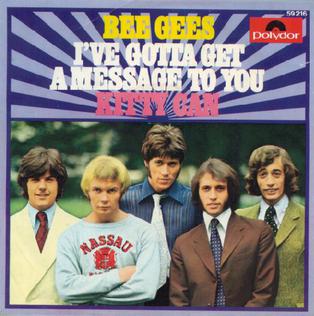
"I've Gotta Get a Message to You" is a song by the Bee Gees. Released as a single in 1968, it was their second number-one hit in the UK Singles Chart, and their first US Top 10 hit. Barry Gibb re-recorded the song with Keith Urban for his 2021 album Greenfields.

"How Can You Mend a Broken Heart" is a song released by the Bee Gees in 1971. It was written by Barry and Robin Gibb and was the first single on the group's 1971 album Trafalgar. It was their first US No. 1 single and also reached No. 1 in Cashbox magazine for two weeks.
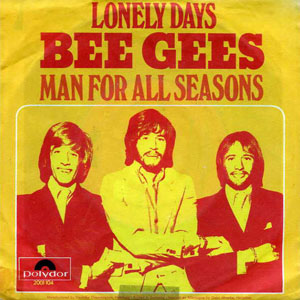
"Lonely Days" is a ballad written and performed by the Bee Gees. It appeared on their album 2 Years On, and was released as a single, becoming their first Top Five hit in the US, peaking at number three in the Billboard Hot 100 and reaching number one in the Cashbox and Record World charts. Barry Gibb later re-recorded the song with country quartet Little Big Town for his 2021 album Greenfields.
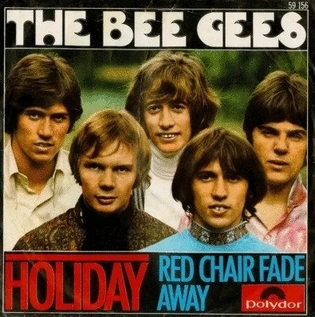
"Holiday" is a song released by the Bee Gees in the United States in September 1967. It appeared on the album Bee Gees' 1st. The song was not released as a single in their native United Kingdom because Polydor UK released the single "World" from their next album Horizontal.
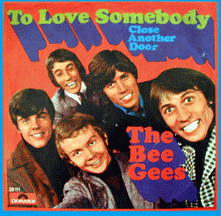
"To Love Somebody" is a song written by Barry and Robin Gibb. Produced by Robert Stigwood, it was the second single released by the Bee Gees from their international debut album, Bee Gees 1st, in 1967. The single reached No. 17 in the United States and No. 41 in the United Kingdom. The song's B-side was "Close Another Door". The single was reissued in 1980 on RSO Records with "How Can You Mend a Broken Heart" as its flipside. The song ranked at number 94 on NME magazine's "100 Best Tracks of the Sixties". It was a minor hit in the UK and France. It reached the top 20 in the US. It reached the top 10 in Canada.
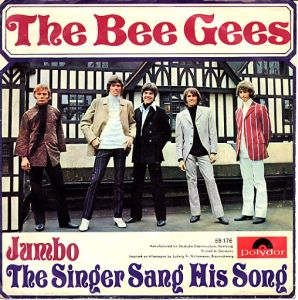
"Jumbo" is a song released by the Bee Gees, written by Barry, Robin and Maurice Gibb. It was released as a double A side with "The Singer Sang His Song" but featured as the lead track in some territories.

"First of May" is a song by the Bee Gees with lead vocals by Barry Gibb, released as a single from their 1969 double album Odessa. Its B-side was "Lamplight". It also featured as the B-side of "Melody Fair" when that song was released as a single in the Far East in 1971 as well as in 1976 and 1980 on RSO Records. It was the first Bee Gees single to be released after lead guitarist Vince Melouney had left the group.

"I.O.I.O." is a song by the Bee Gees, released on the album Cucumber Castle. It was written by Barry and Maurice Gibb. The song was released as a single in March 1970, and was also one of the highlights of the album. The single was a relative success mainly on European charts. Its music video is taken from the film Cucumber Castle.

Bee Gees' 1st is the third studio album by the Bee Gees, and their first international full-length recording after two albums distributed only in Australia and New Zealand. Bee Gees' 1st was the group's debut album for the UK Polydor label, and for the US Atco label. Bee Gees 1st was released on 14 July 1967 in the UK. On 9 August it entered the UK charts; on that same day, the album was released in the US, and it entered the US charts on 26 August.

"Mr. Natural" is a song by the Bee Gees, written by Barry and Robin Gibb. On 29 March 1974, it was released as a single and also released on the album of the same name in 1974. It was backed with a folk rock number "It Doesn't Matter Much to Me". The group's first single which was produced by Arif Mardin.

"Don't Wanna Live Inside Myself" is a ballad written and sung by Barry Gibb, and released on the Bee Gees' album Trafalgar in 1971, and the second single release taken from the album.

"Run to Me" is a song by the Bee Gees, the lead single from the group's album To Whom It May Concern (1972). The song reached the UK Top 10 and the US Top 20.

"Fanny (Be Tender with My Love)" is a song written and performed by the Bee Gees for their Main Course album in 1975. It was the third single release from the album, peaking at number 12 on the United States Billboard Hot 100 and number two in Canada. According to Maurice Gibb, producer Quincy Jones called "Fanny" one of his favorite R&B songs of all time.

